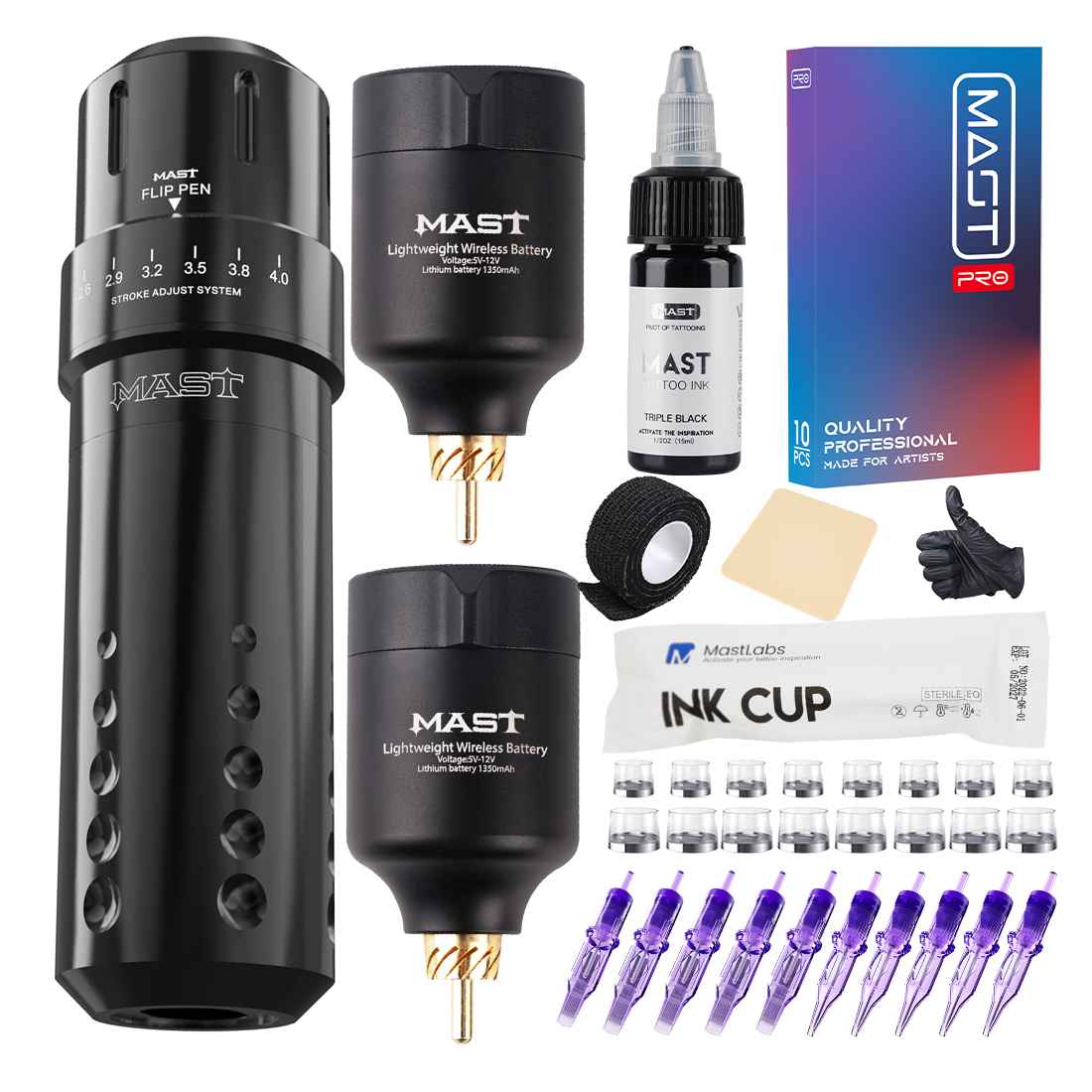In a tattoo shop, you’ll notice artists carefully wrapping their tattoo machines in plastic after use. But why do tattoo artists wrap their machines? This wrapping keeps the equipment hygienic and functional.
This article explores why tattoo machine wrapping is so important. We’ll look at how it prevents contamination, preserves machine performance, signifies professional standards, and more. Read on to understand this ubiquitous practice in the tattoo industry.
Why Do Tattoo Artists Wrap Their Machines
There are may reasons they do this, but be sure they are actually good reasons. Let’s see sme of them.
1. Preventing Cross-Contamination
The main reason tattoo artists religiously wrap their machines is to avoid cross-contamination between clients. Unwrapped machines can transfer blood and bodily fluids:
– Bloodborne Pathogens – Unwrapped machines transfer hepatitis, HIV, herpes, and other infectious agents from one client to the next if proper sterilization doesn’t occur between sessions.
– Bacterial Infections – Bacteria like staphylococcus are easily transmitted by tools that come in contact with open skin, causing painful infections.
– Allergen Transfer – Substances clients are allergic to like certain metals, soaps, and inks can be passed between unwrapped machines, causing reactions.
– Ink and Pigment Transfer – Tiny amounts of residual ink on machine parts can migrate colors between clients, muddying the palette.
Proper machine wrapping protects each unique client while also shielding the artist from occupational biohazard exposure.
Also Read: What is Tattoo Transfer Gel? A Guide to Using Transfer Products for Stencils
2. Keeping Machines Clean and Hygienic
Wrapping keeps tattoo machines free of contaminants to maintain clean and safe operation:
– Clear Visibility – Plastic wrapping provides a transparent barrier allowing artists to still monitor machine performance while protected.
– Barrier Protection – The plastic forms a shield preventing airborne microbes from settling into small crevices.
– Dust Control – Wraps prevent fine particle buildup in moving parts that can degrade performance and cause audible rattling.
– Ink Control – Wrapping blocks stray ink drips during lining and shading work from congealing on the motor.
– Residue Control – It minimizes buildup of grime like excess skin oils and blood residue that impede precision.
Meticulous wrapping habits instill confidence in both artist and client of a hygienic workspace.
3. Maintaining Peak Performance
Wrapping preserves the tattoo machine’s mechanical integrity:
– Lubrication – Plastic wrapping seals in the thin film of lubricant on components that keeps operation smooth.
– Alignment – It protects alignment and contact between the precise armature bar, needles, and springs from being jostled out of tune.
– Magnetism – Wrapping guards electromagnetic coils that generate the critical magnetic fields from disturbance.
– Friction Control – The wrap prevents parts from rubbing together when not in use, reducing friction wear.
Much like wrapping a violin bow, wrapping even when not actively tattooing safeguards the tool’s ideal function.
Also Read: Can You Use Expired Tattoo Needles? Why Risk It? Laws, and Professional Safety Standards
4. Signifying Professional Standards
Beyond practical protective purposes, tattoo machine wrapping carries symbolic value:
– Attention to Detail – Care in even small practices exhibits an artist’s broader conscientiousness and diligence.
– Quality Assurance – Wrapping shows accountability to clients that sanitation is a priority.
– Projecting Credibility – A neatly wrapped machine inspires confidence in tattoo shop hygiene practices.
– Cues Respect for Equipment – Showing care for tools indicates respect for the craft.
– Demonstrating Protocol Mastery – Executing proper protocol, even in subtle ways like wrapping, proves extensive training.
– Indicating Shop Status – A wrapped machine signifies reputable standing, while an unwrapped one implies dubious operations.
Machine wrapping both preserves function and conveys an artist’s standards.
Also Read: Do Pawn Shops Take Tattoo Equipment? What to Know Before Selling or Buying
Best Practices for Tattoo Machine Wrapping
To properly wrap tattoo machines, do the following;
1. Use Autoclave-Safe Medical Plastic – Ensure the wrap can withstand repeat hot sterilization cycles.
2. Wrap Fully – Cover all parts including coils, contact points, and the motor securely.
3. Wrap Individual Components – Wrap clip cords, power supplies, and foot pedals separately as well.
4. Fold Corners Neatly – Crease corners sharply to prevent catching and tearing.
5. Label Clearly – Note the date and your name to track sterilization status.
6. Wrap Tightly – Eliminate any air pockets and voids to fully protect surfaces.
7. Store Properly – Keep wrapped machines in clean, dry, sterile spaces away from potential contaminants.
8. Unwrap with Care – Unwrap only immediately before use to avoid inadvertent recontamination.
Consistent, proper wrapping techniques ensure machines function optimally while preventing biohazards.
Also Read: Are Tattoo Needles Hollow? A Deep Dive Into Needle Components and Function
Troubleshooting Tattoo Machine Wrapping Concerns
While a simple routine, a few wrapping pitfalls can occur. You have to take note of them to avoid them entirely.
Tears and Holes – Any compromises in the plastic expose machines. Discard any wraps with defects.
Insufficient Wrapping – Make sure to fully envelope each component to prevent cross-contact.
Excessive Bulk – Don’t wrap too thickly as this can impede machine function and heat dispersion.
Reusing Wraps – Always use fresh wraps to avoid transfer of contaminants from previous uses.
Contaminated Storage – Ensure wrapped machines are kept in sterile environments away from dirt, bugs, and moisture.
Label Wear – Re-label any wraps where identifying information has rubbed off or faded over time.
With vigilant attention, these wrapping errors can be avoided to maintain sterility.
If you’re looking for the best quality tattoo needles, I recommend dragonhawk. Check the Dragonhawk official website for amazing discounts.
The Takeaway
Let’s get back to the question, why do tattoo artists wrap their machines? Meticulously wrapping tattoo machines in medical grade plastic after every client is imperative for contamination prevention, machine preservation, and projecting utmost professional standards.
This ubiquitous practice provides a literal barrier between clients while symbolizing an artist’s commitment to safety and integrity. While wrapping adds a small step at the end of sessions, staying diligent about it ensures the very best outcomes for artists, clients, and equipment.
FAQ About Tattoo Machine Wrapping
How often should tattoo machines be wrapped?
Machines should be wrapped in sterile plastic immediately after finishing work on every single client without exception.
Is saran wrap ok for wrapping tattoo machines?
No, standard saran wrap is too porous and permeable. Only medical-grade autoclave plastic should be used.
Why shouldn’t two clients use the same unwrapped machine?
Shared unwrapped machines transmit bloodborne pathogens including hepatitis and HIV due to cross-contamination.
Can you reuse tattoo machine wraps?
No, wraps should always be discarded and changed between clients to prevent cross-contamination.
Do tattoo artists wrap machines to hide their techniques?
No, it’s purely for contamination control and machine preservation, not secrecy. Many artists openly discuss their techniques.
Should tattoo machine power cords be wrapped too?
Yes, all machine components including clip cords and foot pedals should be individually wrapped for full isolation.
How does plastic wrapping keep tattoo machines working optimally?
It seals out contaminants while retaining tuned alignment, magnetism, and proper lubrication.
Hopefully this article has shed light on the crucial practice of meticulous tattoo machine wrapping. Please reach out with any other questions!






